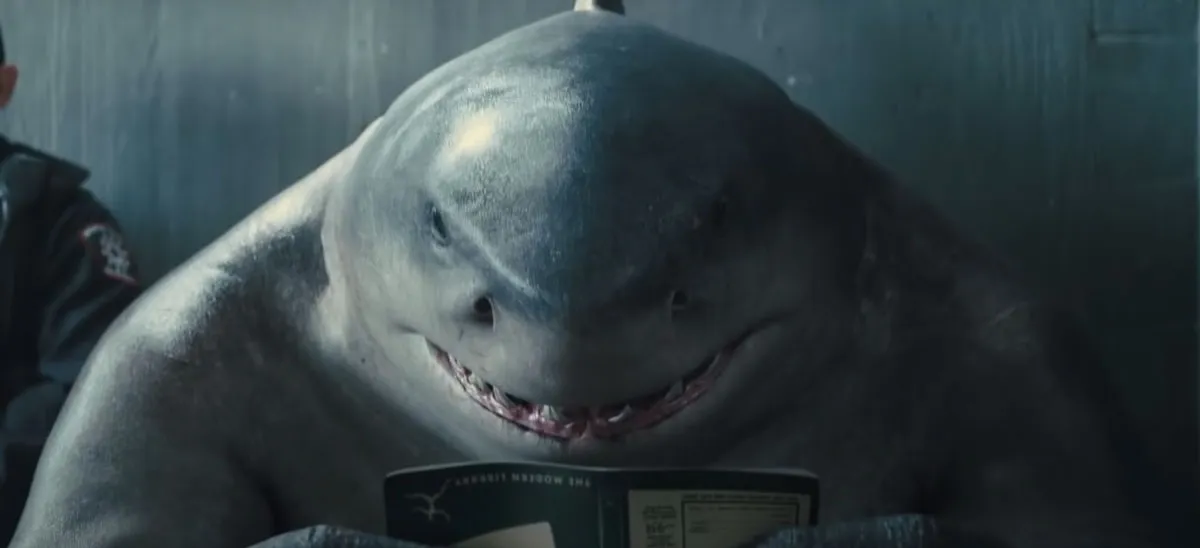Just when you thought it was safe to go back in the water, sharks have started to grow legs and walk about on land. Or at least that’s the idea behind one of The Suicide Squad’s most ludicrous characters: King Shark, a walking, talking great white shark (voiced by Sylvester Stallone) with a low IQ and a high appetite for human meat.
In the comics he is the son of a shark god. In the film, he is part of a team of supervillains recruited for a high-stakes suicide mission. But in real life…?
“In real life King Shark would be screwed,” Dr Lauren Smith, marine biologist and founder of shark conservation organisation Saltwater Life, told BBC Science Focus.
Her main issue is a pretty obvious one: that sharks cannot breathe out of water. But it is also a tad more complicated than that. For the great white shark, says Smith, is also an 'obligate ram ventilator’, which means that in order to extract oxygen from seawater through their gills, they must keep putting continuous pressure on them to pump. In other words, if the great white shark stops swimming, it dies.
“King Shark would need something akin to a reverse scuba unit,” says Smith. “So instead of carrying a tank with air for us to breathe underwater, he would need a tank filled with oxygen-enriched seawater that could be pumped across his gills.”
She would also recommend King Shark bringing along some kind of brine solution for his eyes. “Sharks do have eyelids, but they are very small and do not meet in the middle. King Shark would probably have a few issues with dry eyes.”
Read more about the science of sharks:
- Megalodon shark was an absolute unit, scientists confirm
- Young great white sharks use ‘training grounds’ to learn to hunt
Smith has a few issues herself with how King Shark reflects on the wider shark community. For a start, King Shark only has three gill slits, but sharks tend to have between five and seven (great whites have five). Sharks are also a lot more intelligent than The Suicide Squad gives them credit for.
"In recent years a lot has been learnt about shark intelligence,” says Smith. “For example, research has shown that they can be trained to recognise shapes and navigate mazes. Not only that, but they can also actually retain this information and are able to repeat these tasks months and even years later. Even more incredible is that they can even teach other sharks how to do these things!”
According to Smith, the most questionable element of King Shark however is his taste for human meat.
“Human flesh is in no way desirable to sharks,” she explains. “The great white changes its prey source as it grows – fish and then seals, something which is reflected in their changing dentition as they grow.
"Shark bites on humans do happen. These are a result of a combination of factors such as poor water visibility, curiosity, mistaken identity. Today, more humans are in the water than ever before and for longer periods, thanks to the evolution of wetsuits and drysuits. When you think about the number of people in the water, incidents between sharks and humans are extremely occasional.”

King Shark feeds into a wider image of sharks as dangerous dead-eyed man-eating monsters; a problem that has plagued the species since the most famous shark movie of all, Steven Spielberg’s 1975 blockbuster Jaws.
As Smith explains, the film sparked an enormous hunting frenzy of sharks, with one estimate suggesting that in the years following Jaws the number of large sharks along the eastern seaboard of North America fell by 50 per cent.
The change in perception was so profound, in fact, that original author Peter Benchley went on the record to say that, if given the choice, he would never have written the book the film was based on. He then went on to dedicate the rest of his life to the conservation of great white sharks.
“I’ve lost count of the number of times I have seen headlines like ‘man eater’ or ‘ocean of fear,’” says Smith. “This is usually in relation to basking sharks (who feed on plankton!) when they visit our shores through the spring, summer and early autumn. Responsible journalism – reporting facts and not amping up the fear – is key for the support of the protection of sharks by the public.”
Responsible journalism –just like this.
About our expert, Dr Lauren Smith
Dr Lauren Smith is a marine biologist, studying for her PhD at the University of Aberdeen. She also is the head of shark conservation organisation Saltwater Life, as well as being a wildlife photographer and qualified diver. Her written work has been published in the likes of The Guardian and BiOME Ecology magazine.
You can follow her on Twitter.
The Suicide Squad is out in UK cinemas now